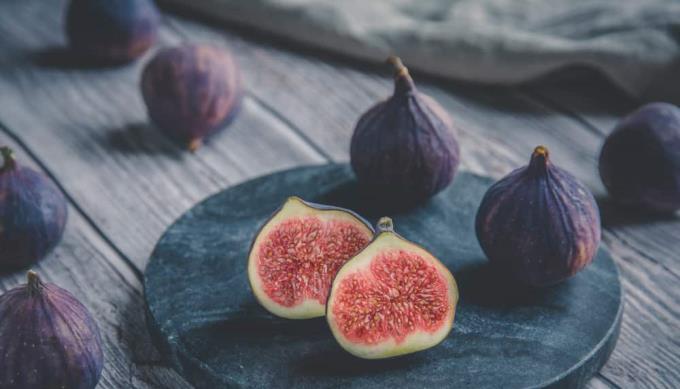Figs are inherently folk dishes associated with childhood memories of many generations. However, few people know that this fruit brings many valuable health benefits, especially for expectant mothers. So what is the use of figs and how to safely use them during pregnancy? The answer lies in the article below.
Figs appear quite a lot in every meal, especially the five-fruit tray of every Vietnamese family. Because, we people believe that the presence of figs in the first days of the year has a spiritual meaning, symbolizing fullness and fullness.
How about eating figs? In fact, this fruit tastes quite acrid when eaten, so often people will choose the variety of American figs with larger fruit and sweeter taste to use. Moreover, the use of this fig on pregnancy is remarkable. For more information, please refer to the following readings right away!
Answer whether pregnant women eat figs good or not
There are two types of American figs that are popular in the market, the fresh and the dried ones. Up to now, there have not been any studies to prove any disadvantage to the fetus when eating figs, so pregnant mothers can safely consume this fruit during pregnancy.
The nutritional value of figs

Most of the uses of figs mentioned in this article are related to the nutrients present in this fruit. According to experts, 50 grams of figs provide the following nutritional content:
Calories: 30
Fat: 0.1g
Sodium: 0.4mg
Carbohydrate: 7.7g
Fiber: 1.2g
Sugar: 6.5g
Protein: 0.3g.
Not only that, figs also contain many vitamins and minerals that are beneficial for the health of pregnant mothers, including:
Vitamin A
Vitamin C
Vitamin K
Vitamin B
Potassium
Magnesium
Zinc
Copper
Manganese
Iron
The use of figs for pregnant women
With the above valuable nutrients, pregnant women who eat figs will receive many benefits as follows:
1. Increase the amount of calcium absorbed
Calcium is an essential mineral for fetal bone and teeth development. Besides, calcium also helps to strengthen the mother's bones during and after pregnancy, helping you to feel comfortable performing these row activities.
If there is a deficiency of this mineral, pregnant mothers are very susceptible to osteoporosis. Besides milk, cheese, eggs, figs are also on the list of calcium-rich foods that you cannot ignore. Because, every 100 grams of figs contain up to 50mg of calcium, which is a fairly plentiful source of calcium, no less than those mentioned above.
2. Helping to regulate blood pressure is the use of figs

One use of figs for pregnant women is highly appreciated is the benefits for the heart. Figs contain more potassium and less salt, helping to reduce blood pressure during pregnancy . The high concentration of polyphenol antioxidants in figs help prevent atherosclerosis, which is dangerous for anyone.
Figs are also a good choice to prevent gestational diabetes. This is because this fruit is a good source of potassium, but low in sodium. This will help reduce blood sugar.
3. Provides good fats
Figs are high in omega-3, omega-6, fatty acids and phytosterols. These substances help reduce cholesterol levels in the blood, while keeping the walls of blood vessels stretching well and healthy. The fiber in figs also helps to remove bad cholesterol from the body.
Not to mention, the above fatty acids also contribute to the development of fetal brain, a very important factor that any pregnant mother should pay attention to.
4. Protect the eyes of figs
Another use of figs is to protect and improve vision health when you are pregnant. According to one eye study, eating three or more figs a day can help reduce the likelihood of developing age-related macular degeneration .
5. Prevent anemia
Iron deficiency anemia during pregnancy is always on the list of health problems that pregnant mothers need to consider. Iron deficiency can lead to a lack of oxygen to the fetus as well as many other serious consequences. You should consider supplementing this mineral through a fruit supplement that is rich in iron, helps prevent fatigue caused by anemia during pregnancy .
Furthermore, figs are also rich in vitamin C, which will effectively support the absorption of iron in the body, preventing the risk of anemia.
6. Improve digestion

Figs are a good source of fiber, helping to reduce the feeling of hunger and hunger and create a feeling of fullness for a long time. This fruit will help you regulate bowel movements and prevent constipation during pregnancy. The probiotics in figs also support the growth of beneficial bacteria in the gut and digestive system.
7. Repel morning sickness, beautiful skin and hair
Vitamin B6 present in figs will help pregnant mothers reduce morning sickness during pregnancy . Not only that, this fruit also possesses special ingredients that are very beneficial for women such as flavonoids, polyphenols. These are compounds that play the role of anti-oxidants, improve pigmentation, resulting in smooth white skin. With hair, both flavonoids and polyphenols will make hair healthy and smoother.
To do this, every day, mothers should squeeze about 3-5 figs, then mix the juice in fresh milk to drink. If you stick to it, you will see a noticeable improvement in 2 weeks.
The drawbacks when eating figs during pregnancy need to be clear
Despite its many benefits to the health of pregnancy, pregnant mothers are advised not to eat too much. This can lead to some of the following risks:
According to Oriental Medicine, the supplement has the effect of blood circulation, so it is not recommended to use it for the new pregnant person, it will easily harm the fetus
The high consumption of figs leads to the accumulation of large amounts of psoralens in the body causing dermatitis
Eating a lot of figs is also easy to damage the digestive system, leading to loose stools
Figs help stabilize blood pressure and blood sugar, but if used much, it will have adverse effects
Allergic, if you have an allergy to pollen , strawberry fruit, or latex
Hopefully the above article has clarified the question of whether pregnant women eat figs well or not. In fact, if you know how to process, this fruit can make many delicious and nutritious dishes for pregnant mothers. However, each pregnant woman has a different condition, so you should consult your doctor before eating a supplement.














